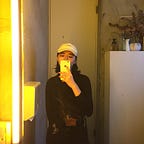My mother started the San Francisco version of the Joy Luck Club in 1949, two before I was born. This was the year my mother and father left China with one stiff leather trunk filled only with fancy silk dresses. There was no time to pack anything else, my mother had explained to my father after they boarded the boat. Still his hands swam frantically between the slippery silks, looking for his cotton shirts and wool pants.
When they arrived in San Francisco, my father made her hide those shiny clothes. She wore the same brown-checked Chinese dress until the Refugee Welcome Society gave her two hand-me-down dresses, all too large in sizes for American women. The society was composed of a group of white-haired American missionary ladies from the First Chinese Baptist Church. And because of their gifts, my parents could not refuse their invitation to join the church. Nor could they ignore the old ladies’ practical advice to improve their English through Bible study class on Wednesday nights and, later, through choir practice on Saturday mornings. This was how my parents met the Hsus, the Jongs, and the St. Clairs. My mother could sense the women of these families also had unspeakable tragedies they had left behind in China and hopes they couldn’t begin to express in their fragile English. Or at least, my mother recognized the numbness in these women’s faces. And she saw how quickly their eyes moved when she told them her idea for the Joy Luck Club.
Joy Luck Club was an idea my mother remembered from the days of her first marriage in Kweilin, before the Japanese came. That’s why I think of Joy Luck as her Kweilin story. It was the story she would always tell me when she was bored, when there was nothing to do, when every bowl had been washed and the Formica table had been wiped down twice, when my father sat reading the newspaper and smoking on Pall Mall cigarette after another, a warning not to disturb him. This is when my mother would take out a box of old ski sweaters sent to us by unseen relatives from Vancouver. She would snip the bottom of a sweater and pull out a kinky thread of yarn, anchoring it to a piece of cardboard. And as she began to roll with one sweeping rhythm, she would start her story. Over the years, she told me the same story, except for the ending, which grew darker, casting long shadows into her life, and eventually into mine.
1949年,在我出生的兩年前,母親發起了在舊金山的喜福會。那年父親和母親提了一只裝滿華麗綢緞洋裝的硬皮箱離開中國,沒有時間打包其他東西了,登船時她向父親解釋,但父親還是伸手游進一箱絲綢尋找他的棉質襯衫和羊毛長褲。
他們抵達舊金山時父親要她把華裳都藏起來,母親穿著中式的棕色格子洋裝直到難民救助社群給了她兩件對美國女人來說都太大的二手衣。社群是由一群第一華人浸信會的白髮傳教女人們組成,父母親在收下他們的贈禮之後不好意思拒絕,就這樣加入教會,也無法忽略他們善意的建言,後來加入了禮拜三晚上的聖經拜讀和禮拜六早上的聖歌合唱為了學習英文。父母親就是在這裡認識徐家、鐘家和聖克萊爾家。母親的直覺感受到這些家庭也有被留在中國說不出口的悲傷故事和脆弱的英文無法表達的內心希望,或者說至少,她認出他們僵直的臉,而後,母親和他們分享喜福會的想法,她看見那些快速轉動的雙眼。喜福會是母親在桂林的記憶,在日本人入侵之前,她在那經歷了第一段婚姻,大概是這個原因,我一直覺得喜福會是其中一段母親的桂林故事。那是一段母親無聊時和我提起的記憶,當她沒有其他事要做時,碗都洗乾淨了、餐桌也被擦過兩回,當父親坐著一邊讀報,一邊接連抽著威豪香菸,代表別打擾他時,母親會拿出盒子裡一件舊的滑雪毛衣,一個未曾見過的親戚從渥太華寄來的禮物,她剪斷毛衣底部的其中一條線,拉出捲曲的線頭繞上一塊紙板,手邊快速的旋轉,娓娓說起這個故事。這些年過去她總是說著同一個故事,只有結局不同,越來越陰暗的結局在母親的生活中投射了深長的陰影,最後也投射進我的生活。
